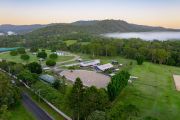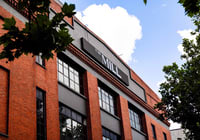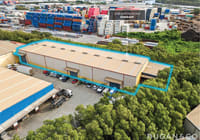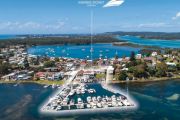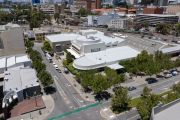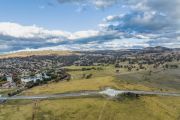
Prized New England farm on the market
Prominent Armidale district couple John and Annette Cassidy have decided it’s time to downsize their extensive pastoral interests, resulting in a rich new listing at Ebor, in the NSW New England region.
Ray White Rural has listed for sale the three-property “Glen Alvie Aggregation”, putting into play one of the most productive grazing operations on the New England’s Eastern Fall.
At a total area of 2145 hectares (5299 acres), the aggregation is also one of the largest holdings in the intensive, high-rainfall Ebor district, making it a rich prize for serious investors.
An engineer by background and former head of the Abigroup construction company, Mr Cassidy became involved in agriculture when he and his wife purchased “Merilba” at Kingstown, near Uralla, in 1982.
Today the 12,000-hectare “Merilba”, where they live, is home to a large South Devon stud and commercial cattle herd, Merino sheep, prime lambs and a vineyard.
The Cassidys also own “Boxwood” at Quirindi, and “Arding” at Armidale where they have a White Suffolk and Poll Dorset stud.
The buildup of the Ebor country started in 2004 with the purchase of the 1239-hectare “Hillview”, followed later the same year with the auction purchase of the 656-hectare “Glen Alvie”. Both were originally soldier-settler blocks, and later held for many years by the Muller family. An adjoining block, “Highfield” of 250 hectares, was added in 2005, making up the 2145-hectare parcel now for sale as “Glen Alvie Aggregation”.
Situated just on the eastern boundary of Ebor and 79 kilometres east of Armidale, “Glen Alvie Aggregation” is central to some of the richest, best-watered grazing country in eastern Australia.
The property is described as mostly level to gently undulating, with areas of hill and plateau, cleared for grazing except for shade and shelter trees of black sally and white gum.
Deep soils of predominantly chocolate basalt support a diverse pasture mix incorporating ryegrass, cocksfoot, fescue, phalaris, kikuyu, paspalum, chicory and clovers.
As currently managed, and worked by two full-time employees, the property supports a permanent flock of 2700 crossbred ewes raising around 125 per cent prime lambs.
It is also used to grow out two annual batches of 1200 weaner cattle from the autumn and spring calvings on “Merilba”.
Steers are turned off as 450-540-kilogram feeders, and the pick of the heifers joined before returning to “Merilba”.

The aggregation is one of the largest holdings in the intensive, high-rainfall Ebor district.
Average rainfall is in the 1250-1500mm range, providing ample run-off into the property’s 70-odd dams, which are supplemented by two wells pumping to two storage tanks.
The property is subdivided into 46 main paddocks and a fenced laneway facilitates stock movement to the main handling facilities, a four-stand shearing shed and five sets of cattle yards.
Other working structures are a large workshop with concrete floor (attached to the woolshed) and two steel machinery sheds including one with a lockable workshop bay.
The main “Glen Alvie” homestead is set in established gardens and has four bedrooms, open-plan lounge and dining rooms and a north-facing sunroom.
It is complemented by a three-bedroom double-brick home (“Fred’s House”) built in 1980, a three-bedroom weatherboard home with open-plan kitchen and covered deck (“Hillview”) and a renovated two-bedroom cottage overlooking a large dam (“Mark’s House”).
This story originally appeared in The Land.
